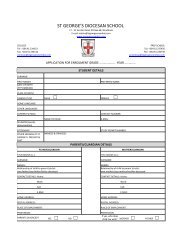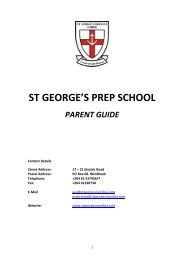Round Square Africa Info.pdf - St George's Diocesan School
Round Square Africa Info.pdf - St George's Diocesan School
Round Square Africa Info.pdf - St George's Diocesan School
You also want an ePaper? Increase the reach of your titles
YUMPU automatically turns print PDFs into web optimized ePapers that Google loves.
<strong>Round</strong> <strong>Square</strong> Exchanges<br />
Adapted from: http://www.roundsquare.org/index.php?id=449<br />
[Downloaded: 2012/02/04]<br />
The exchange program is limited to students attending Global or Regional Member schools.<br />
This starts with an initial enquiry, either from another school or from one of your own students. The<br />
quickest way to gain preliminary information is to engage with the proposed exchange school via the<br />
membership list on the <strong>Round</strong> <strong>Square</strong> website.<br />
The advantage of a <strong>Round</strong> <strong>Square</strong> exchange is that you will quickly get to know the <strong>St</strong>aff Reps at<br />
reciprocal schools and this allows for direct and personal communication making it more likely that<br />
an appropriate pairing can be made. It is assumed that the schools involved endorse the pupils as<br />
suitable ambassadors for their school, for <strong>Round</strong> <strong>Square</strong> and for their country.<br />
It is not unknown for boarding schools to take one way exchanges on the understanding that the<br />
return exchange will occur at a later date.<br />
The length of an exchange can vary considerably, from one month to one full term.<br />
1. The student fills in an exchange form. The official <strong>Round</strong> <strong>Square</strong> Exchange Form can be<br />
downloaded from the website.<br />
2. Once the forms are completed and schools/regions selected, the process of communication<br />
between the two schools starts. Initial enquiries (which are also often initiated at conferences)<br />
about the feasibility of the exchange will require the faxing or emailing of forms.<br />
3. At this stage it is probably best practice to work only through the <strong>St</strong>aff Rep though some schools<br />
do work differently. Each school may also have its own requirements.<br />
4. Once the exchange is confirmed, parents handle travel, insurance and visas (although as Rep you<br />
will need to check that this is all in order). The <strong>St</strong>aff Rep is responsible for internal paperwork and<br />
communication with the host school.<br />
5. There may be a need for an acceptance of a Cultural Exchange letter, or written confirmation that<br />
the student is involved in educational and cultural activity only.<br />
6. For an exchange under three months, a tourist visa may be best – depending on the country.<br />
7. Whilst the exchange is underway there should be open communication between parents and <strong>St</strong>aff<br />
Reps. Email is easiest. <strong>St</strong>udents often communicate via Facebook.<br />
8. Whilst on exchange, students must expect to be subject to the rules of the host school. This will<br />
apply to such matters as work ethic, behaviour, drinking and smoking etc. It is expected that<br />
whilst on exchange, students will engage in some form of community service.<br />
9. National exchanges operate on similar lines but are usually of a shorter duration.<br />
15 | U pdated: 2012/07




